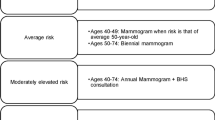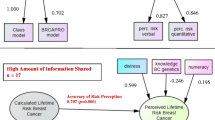Abstract
Evidence is accumulating of the clinical utility of single nucleotide polymorphisms to effectively stratify risk of breast cancer. Yet for this personalized polygenic information to be translated to clinical practice, consideration is needed about how this personalized risk information should be communicated and the impact on risk perception. This study examined the psychosocial implications and the impact on risk perception of communicating personalized polygenic breast cancer risk to high-risk women. High-risk women with a personal history of breast cancer and an uninformative BRCA1/2 result were genotyped in the Variants in Practice study for 22 breast cancer single nucleotide polymorphisms. Participants in the highest quartile of polygenic breast cancer risk were invited to receive their individual research results. Two personalized visual risk communication tools were used to facilitate communication of the polygenic information. Participants subsequently undertook a semi-structured interview examining their experience of receiving their polygenic breast cancer risk and their breast cancer risk perception. Thirty-nine women opted to receive their results and were interviewed. The women described the risk communication tools as helpful as the tool enabled comparison of their personalized breast cancer risk to the general population. Participants incorporated the polygenic risk information into their breast cancer risk perception, which for some reawakened feelings of being at risk years after an uninformative BRCA1/2 result. However, few reported any detrimental emotional impact. The delivery of personalized polygenic breast cancer risk to high-risk women informed and modified their breast cancer risk perception with little emotional impact.


Similar content being viewed by others
References
Abel EK, Browner CH (1998) Selective compliance with biomedical authority and the uses of experiential knowledge. In: Lock M, Kaufert PA (eds) Pragmatic women and body politics. Cambridge Studies in Medical Anthropology. Cambridge University Press, Cambridge, pp 310–326
Antoniou A et al (2003) Average risks of breast and ovarian cancer associated with BRCA1 or BRCA2 mutations detected in case series unselected for family history: a combined analysis of 22 studies. Am J Hum Genet 72:1117–1130
Austin JC (2010) Re-conceptualizing risk in genetic counseling: implications for clinical practice. J Genet Couns 19:228–234. https://doi.org/10.1007/s10897-010-9279-z
Austin JC, Honer WG (2008) Psychiatric genetic counselling for parents of individuals affected with psychotic disorders: a pilot study. Early Interv Psychiatry 2:80–89. https://doi.org/10.1111/j.1751-7893.2008.00062.x
Bancroft EK et al (2014) “It’s all very well reading the letters in the genome, but it’s a long way to being able to write”: men’s interpretations of undergoing genetic profiling to determine future risk of prostate cancer. Fam Cancer 13:625–635. https://doi.org/10.1007/s10689-014-9734-3
Bancroft EK et al (2015) The psychological impact of undergoing genetic-risk profiling in men with a family history of prostate cancer. Psychooncology 24:1492–1499. https://doi.org/10.1002/pon.3814
Chowdhury S et al (2013) Incorporating genomics into breast and prostate cancer screening: assessing the implications. Genet Med 15:423–432. https://doi.org/10.1038/gim.2012.167
d’Agincourt-Canning L (2005) The effect of experiential knowledge on construction of risk perception in hereditary breast/ovarian cancer. J Genet Couns 14:55–69
Galesic M, Garcia-Retamero R, Gigerenzer G (2009) Using icon arrays to communicate medical risks: overcoming low numeracy. Health Psychol 28:210–216. https://doi.org/10.1037/a0014474
Gigerenzer G, Edwards A (2003) Simple tools for understanding risks: from innumeracy to insight. Br Med J 327:741–744. https://doi.org/10.1136/bmj.327.7417.741
Gigerenzer G, Hoffrage U (1995) How to improve bayesian reasoning without instruction: frequency formats. Psychol Rev 102:684–704
Glaser BG, Strauss AL (1967) The discovery of grounded theory: strategies for qualitative research. Aldine Transaction, New Brunswick
Graves KD, Peshkin BN, Luta G, Tuong W, Schwartz MD (2011) Interest in genetic testing for modest changes in breast cancer risk: implications for SNP testing. Public Health Genomics 14:178–189. https://doi.org/10.1159/000324703
Hall MJ, Ruth KJ, Chen DY, Gross LM, Giri VN (2015) Interest in genomic SNP testing for prostate cancer risk: a pilot survey. Hered Cancer Clin Pract 13:11. https://doi.org/10.1186/s13053-015-0032-3
Hamajima N et al (2002) Alcohol, tobacco and breast cancer—collaborative reanalysis of individual data from 53 epidemiological studies, including 58,515 women with breast cancer and 95,067 women without the disease. Br J Cancer 87:1234–1245. https://doi.org/10.1038/sj.bjc.6600596
Henneman L, Timmermans DR, Bouwman CM, Cornel MC, Meijers-Heijboer H (2011) ‘A low risk is still a risk’: exploring women’s attitudes towards genetic testing for breast cancer susceptibility in order to target disease prevention. Public Health Genomics 14:238–247. https://doi.org/10.1159/000276543
Julian-Reynier C, Welkenhuysen M, Hagoel L, Decruyenaere M, Hopwood P (2003) Risk communication strategies: state of the art and effectiveness in the context of cancer genetic services. Eur J Hum Genet 11:725–736
Kenen R, Arden-Jones A, Eeles R (2003) Family stories and the use of heuristics: women from suspected hereditary breast and ovarian (HBOC) families. Sociol Health Illn 25:838–865
Kurzenhauser S, Dieckmann A (2009) Risk communication: simple tools to foster understanding. In: Smoller JW, Sheidley BR, Tsuang MT (eds) Psychiatric genetics: applications in clinical practice. American Psychiatric Publishing, pp 47–65
Leventhal KG et al (2013) “Is it really worth it to get tested?”: primary care patients’ impressions of predictive SNP testing for colon cancer. J Genet Couns 22:138–151. https://doi.org/10.1007/s10897-012-9530-x
Li H et al (2016) Breast cancer risk prediction using a polygenic risk score in the familial setting: a prospective study from the Breast Cancer Family Registry and kConFab. Genet Med 19:30. https://doi.org/10.1038/gim.2016.43 https://www.nature.com/articles/gim201643#supplementary-information
Lobb EA et al (2003) Women’s preferences and consultants’ communication of risk in consultations about familial breast cancer: impact on patient outcomes. J Med Genet 40:e56
Mavaddat N et al (2015) Prediction of breast cancer risk based on profiling with common genetic variants. J Natl Cancer Inst 107. https://doi.org/10.1093/jnci/djv036
Maxwell KN, Nathanson KL (2013) Common breast cancer risk variants in the post-COGS era: a comprehensive review. Breast Cancer Res 15:212. https://doi.org/10.1186/bcr3591
McAllister M (2003) Personal theories of inheritance, coping strategies, risk perception and engagement in hereditary non-polyposis colon cancer families offered genetic testing. Clin Genet 64:179–189
Michailidou K et al (2013) Large-scale genotyping identifies 41 new loci associated with breast cancer risk. Nat Genet 45:353–361, 361e351-352. https://doi.org/10.1038/ng.2563
Michailidou K et al (2015) Genome-wide association analysis of more than 120,000 individuals identifies 15 new susceptibility loci for breast cancer. Nat Genet 47:373–380. https://doi.org/10.1038/ng.3242
Nusbaum R et al (2013) Translational genomic research: protocol development and initial outcomes following SNP testing for colon cancer risk. Transl Behav Med 3:17–29. https://doi.org/10.1007/s13142-012-0149-0
Parkin DM, Boyd L (2011) 8. Cancers attributable to overweight and obesity in the UK in 2010. Br J Cancer 105:S34–S37. https://doi.org/10.1038/bjc.2011.481
Sawyer S, Mitchell G, McKinley J, Chenevix-Trench G, Beesley J, Chen XQ, Bowtell D, Trainer AH, Harris M, Lindeman GJ, James PA (2012) A role for common genomic variants in the assessment of familial breast cancer. J Clin Oncol 30:4330–4336
Shieh Y et al (2016) Breast cancer risk prediction using a clinical risk model and polygenic risk score. Breast Cancer Res Treat 159:513–525. https://doi.org/10.1007/s10549-016-3953-2
Smit AK, Keogh LA, Hersch J, Newson AJ, Butow P, Williams G, Cust AE (2016) Public preferences for communicating personal genomic risk information: a focus group study. Health Expect 19:1203–1214. https://doi.org/10.1111/hex.12406
Strauss A, Corbin J (1994) Grounded theory methodology: an overview. In: Denzin NK, Lincoln YS (eds) Handbook of qualitative research. Thousand Oaks Sage Publications, California, pp 273–285
Vachon CM, Pankratz VS, Scott CG, Haeberle L, Ziv E, Jensen MR, Brandt KR, Whaley DH, Olson JE, Heusinger K, Hack CC, Jud SM, Beckmann MW, Schulz-Wendtland R, Tice JA, Norman AD, Cunningham JM, Purrington KS, Easton DF, Sellers TA, Kerlikowske K, Fasching PA, Couch FJ (2015) The contributions of breast density and common genetic variation to breast cancer risk. J Natl Cancer Inst 107:107. https://doi.org/10.1093/jnci/dju397
Yanes T, Meiser B, Young MA, Kaur R, Mitchell G, Barlow-Stewart K, Roscioli T, Halliday J, James P (2017) Psychosocial and behavioral impact of breast cancer risk assessed by testing for common risk variants: protocol of a prospective study. BMC Cancer 17:491. https://doi.org/10.1186/s12885-017-3485-0
Young MA et al (2017) Making sense of SNPs: women’s understanding and experiences of receiving a personalized profile of their breast cancer risks. J Genet Couns. https://doi.org/10.1007/s10897-017-0162-z
Acknowledgements
The authors would like to acknowledge all the women who took part in this study and gave their time so generously to participate in an interview. We would also like to acknowledge and thank the team in the Parkville Familial Cancer Centre at Peter MacCallum Cancer Centre for accommodating the processes involved in this study. Many thanks to Rowan Forbes Shepherd, Maatje Scheepers-Joynt, and Victoria Rasmussen for their feedback on the manuscript.
Funding
Dr. Laura Forrest is funded by a postdoctoral fellowship from the National Breast Cancer Foundation, Australia.
Author information
Authors and Affiliations
Corresponding author
Ethics declarations
All procedures followed were in accordance with the ethical standards of the responsible committee on human experimentation (institutional and national) and with the Helsinki Declaration of 1975, as revised in 2000 (5).
Informed consent
Informed consent was obtained from all individual participants included in the study.
Conflict of interest
The authors declare that they have no conflicts of interest.
Rights and permissions
About this article
Cite this article
Forrest, L.E., Sawyer, S.D., Hallowell, N. et al. High-risk women’s risk perception after receiving personalized polygenic breast cancer risk information. J Community Genet 10, 197–206 (2019). https://doi.org/10.1007/s12687-018-0378-0
Received:
Accepted:
Published:
Issue Date:
DOI: https://doi.org/10.1007/s12687-018-0378-0




